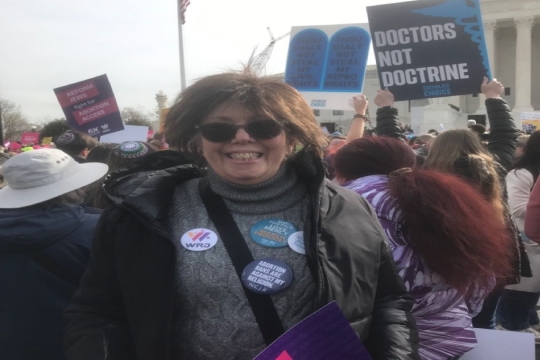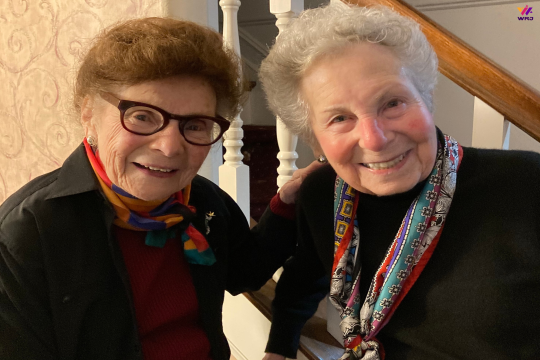
Parashah Chayei Sarah resonated with me in ways I never thought could be possible from a biblical story. I truly wondered how a story thousands of years old could relate to my life today and how it would resonate. The parashah name, which when translated actually means the 'Life of Sarah,' is quite ironic because this parashah is not really about Sarah's life but about her death, or is it?
In this Torah portion, we learn that Sarah passes away at the age of 127, and Abraham, while grieving, needs to make some important decisions about how to honor her. His first decision is to purchase a piece of land to bury her. As G-d had promised Abraham that he and his descendants would live in the Promised Land, he was determined to purchase the Cave of Machpelah (located in today's city of Hebron), which would fulfill G-d's promise and provide him with a permanent piece of land in the Promised Land. Abraham negotiates a price with the Hittites for the land he wants and secures it. For anyone who has gone through the mourning/grieving process, we must recognize the strength Abraham must have had to make the decisions he did and also be concerned about the financial impact of those decisions.
It is discussed that one of the reasons Abraham had chosen the Cave of Machpelah as the burial plot for Sarah was that he wanted her buried out of his sight. Is that because he can't bear to see where she is buried or because he believes that Sarah lives with him in his heart and wherever he is, he can speak with her, and she will be present? It is my belief that as long as there is someone alive to tell a story about a person or to remember them, they are not dead – their memory lives on.
As we read on in the parashah, we learn about Abraham's desire to find Isaac a wife and how he goes about it. Can we infer that Abraham is missing his wife and wants his son Isaac to find that same happiness he shared with Sarah? Is this Abraham's way of honoring Sarah and allowing her to live on through her descendants?
Abraham sends Eliezer, his aide-de-camp, out to bring back a bride for Isaac from Abraham's kindred. Eliezer meets Rebekah and is smitten with her good-naturedness and kindness. He is sure that Rebekah will make a good wife for Isaac. Eliezer requests that Rebekah return with him to his home. Rebekah agrees. As I've learned, grieving is not just a personal experience but a familial one as well. Just as Abraham mourned the loss of his wife, Isaac mourned the loss of his mother.
While waiting for the Eliezer to return home, Isaac, who is still mourning the loss of his mother, goes out one evening and meditates in the fields (Genesis 24:63). Is this a correlation between the importance of self-care and the fact that while we are grieving, we need to remember the importance of life and of taking care of oneself?
As Isaac meditates, Rebekah approaches from a distance on camelback. Once she realizes that she is in Isaac's view, she covers her face revealing her modesty. Upon seeing her, Isaac immediately falls in love.
After they marry, Isaac brings Rebekah into his mother Sarah's tent, ensuring that Sarah's legacy lives on through them and their children.
This parashah brought so many feelings to the surface for me. Having lost Eric, my other half, 20 months ago, I was forced to make so many decisions rapidly and while in a state of shock. Truth be told, those last decisions become important ones as they dictate how we honor the person who has passed and, in many ways, becomes the ones we think of regularly. There are still times I wonder if some of those decisions were the right ones, but I can't go back to redo them as much as part of me may want to.
In Judaism, we discuss the importance of community and how we need each other for the survival of our faith and community.……. A minyan is necessary for us to recite certain prayers, and if we think about it, a cemetery is a community too. We congregate there to bury our loved ones and where our loved ones are laid to rest in a place with others. Like Abraham and Sarah, Eric is buried in a family plot started by his grandparents, so he is not alone. A cemetery is also the only place on earth where life and death intersect, where we are allowed in but only temporarily.
As I recall Eric, which is daily, I think of his life, his love, and how his love is a legacy he passed on to us. I believe Eric is with me no matter where I am. I can envision his face, hear his laugh, and, at times, can even feel his love. There are times when I tell a story and, at that moment, he is alive. The interpretation or looking into these stories sometimes brings an additional understanding of how much his actions demonstrated his love, although it may not have been fully recognized at the time. These stories and this unconditional love are part of the legacy that remains.
Another part of the legacy he left (and the path he left for me to follow) was to each of you and WRJ. Before our family moved to Connecticut, we belonged to a Conservative Shul, which was my choice. Eric grew up Reform and became a Bar Mitzvah at a Reform congregation. Upon deciding to move to Connecticut, Eric wanted me to decide which synagogue to join in our new location as we had two options a Conservative and a Reform one. Our older daughter became a Bat Mitzvah at a Conservative synagogue. Our youngest was in her final year of Hebrew school, so he thought for sure I would choose the Conservative one. He was shocked and extremely delighted when I announced that after speaking with both Rabbis, I chose otherwise. Just as Abraham and Eliezer looked for the 'right' place and the 'right' person, so did we as we searched for a new synagogue. Just as Eliezer determined that Rebekah's good-naturedness and openness would be a good fit for Isaac, we determined that the Reform Synagogue would be a good fit for us. As we bring this full circle, this brings me to each of you because Eric brought me into the Reform Movement. Through Eric's life, love, and legacy, I am part of WRJ and a proud Woman of Reform Judaism.
Michelle Rosen is a WRJ Board member and is the Weekly Digest Co-ordinator. She serves as the VP of Social Advocacy for the NorthEast District and is the President of the Sisterhood of B'nai Israel while also sitting on the board of her synagogue. Michelle is the community Liaison for the Middlebury and Southbury (CT) Equity and Inclusion Council. She is a very proud mother of 2 amazing daughters.
Related Posts

Andrea Stillman: A WRJ Leadership Spotlight


